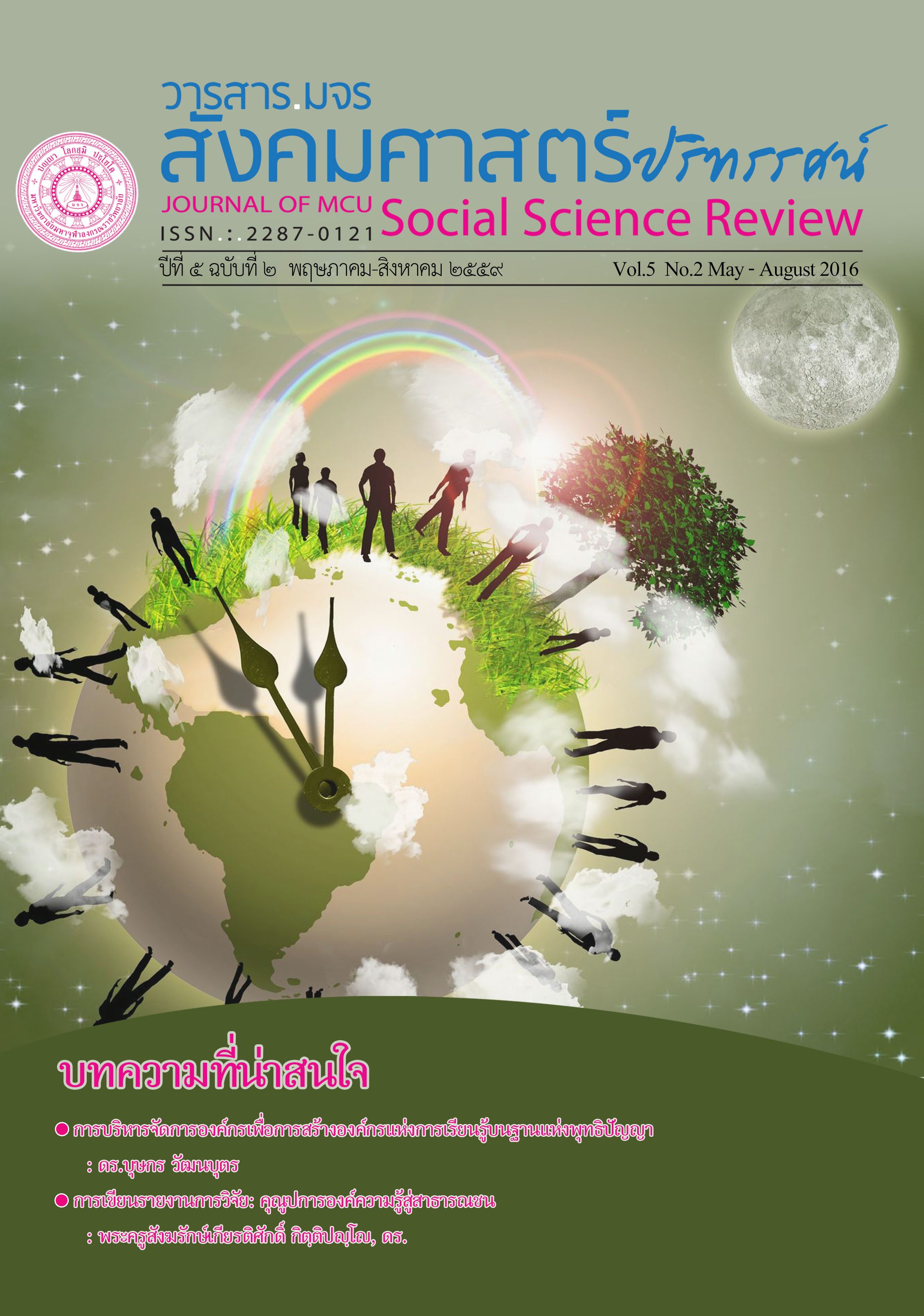รูปแบบการปกครองคณะสงฆ์ที่พึงประสงค์ของพระสังฆาธิการ ในเขตการปกครองคณะสงฆ์ภาค ๑
คำสำคัญ:
รูปแบบการปกครองคณะสงฆ์ที่พงประสงค์, พระสังฆาธิการในเขตการปกครองคณะสงฆ์ ภาค ๑บทคัดย่อ
บทความวิจัยครั้งนี้มีวัตถุประสงค์ ๑) เพื่อศึกษาสภาพทั่วไปและปัญหาอุปสรรคการปกครองของพระสังฆาธิกา ๒) เพื่อศึกษาแนวคิดทฤษฎีและหลักพุทธธรรมที่เหมาะสมสำหรับการปกครองของพระสังฆาธิการ ๓) เพื่อนำเสนอรูปแบบการปกครองคณะสงฆ์ที่พึงประสงค์ของพระสังฆาธิการในเขตการปกครองคณะสงฆ์ภาค ๑ ระเบียบวิธีวิจัยเป็นการวิจัยแบบผสานวิธี ทั้งเชิงคุณภาพและเชิปริมาณ สำหรับการวิจัยชิคุณภาพ ผู้วิจัยได้ศึกษาจากเอกสาร สัมภาษณ์เชิงลึกผู้ทรงคุณวุฒิ จำนวน ด๘ รูป/คน และสนทนากลุ่มเฉพาะ ผู้ทรงคุณวุฒิ จำนวน ๑๐ รูป/คนวิเคราะห์ข้อมูลแบบพรรณนาความ ส่วนการวิจัยเชิงปริมาณ ผู้วิจัยได้เก็บข้อมูลจากกลุ่มตัวอย่างจำนวน ๒๙๗ ชุด วิเคราะห์ข้อมูลโดยสถิติพรรณนาผลการวิจัยพบว่า๑ สภาพทั่วไปและปัญหาอุปสรคกรปกครองของพระสังฆาธิการ ได้แก่ รูปแบบการทำงานอาจจะไชัดเจน ขาดความรัดกุม ไม่รอบคอบ ปฏิบัติหน้าที่อาจจะหย่อนยาน ขาดการบำรุงรักษาวัด ขาดการจัดการศาสนสมบัติให้แหมาะสม ขาดการสอดส่องให้บรรพชิตและคฤหัสถ์ให้ปฏิบัติตามกฎระเบียบ ขาดการส่งเสริมวิชาการปกครองคณะสงฆ์ในยุคปัจจุบัน นอกจากนั้นรูปแบบการระงับอธิกรณ์ การวินิฉัยสั่งการลงนิคหกรรม ข้ออุทธรณ์เป็นต้นอาจจะยังไม่มีความชัดเจน ทั้งการแต่งตั้งและถอดถอนพระสังฆาธิการก็เช่นเดียวกัน สำหรับการวิจัยเชิงปริมาณโดยภาพรวมกลุ่มตัวอย่างมีความคิดเห็นอยู่ในระดับปานกลาง๒. แนวคิดทฤษฎีและหลักพุทธรรมที่เหมาะสมสำหรับการปกครองของพระสังฆาธิการได้แก่ พระสังฆาธิการ อาศัยพระราชบัญญัติคณะสงฆ์จัดรูปแบบการปกครองคณะสงฆ์ส่วนภูมิภาคนอกจากนั้น ทฤษฎีรบบการปกครองประกอบด้วยปัจจัยนำเข้า คือคน เงิน วัตถุอุปกรณ์ และการจัดการประกอบด้วยการวางแผน การสรรหาบุคลากร การพัฒนาบุคลากร การธำรงรักษา และการประเมินการปฏิบัติงน ตามด้วยหล้กอปริหานิยธรรม ๗ กล่าวคือหมั่นประชุมเนื่องนิตย์พร้อมเพรียงกันประชุ ไม่บัญญัติสิ่งที่ทรงห้าม คารพนับถือผู้ใหญ่ ไม่ลุอำนาจตัณหา ยินดีในเสนาสนะ และยินดีกับเพื่อนสพรหมจารีเป็นต้น๓. รูปแบบการปกครองคณะสงฆ์ที่พึงประสงค์ของพระสังฆาธิการในเขตการปกคร องคณะสงฆ์ภาค ๑ ได้แก่ พระสังฆาธิการมีหน้าที่กำกับดูแลรักษาบุคลากรให้อยู่ในกฎระเบียบการปกครอง เป็นไปด้วยความเรียบร้อยดีงม ตามพระธรรมวินัย กฎหมายและสิ่งแวดล้อม การปกครองคณะสงฆ์เป็นงานนำ ต้องคอยปรับปรุเปลี่ยนแปลงให้เหมาะสมตามกาลเวลา ถ้างานปกครองดำเนินไปอย่างใ งานอื่นๆ ก็จะดำเนินไปตามอย่างนั้น ถ้างานปกครองดำเนินไปไม่ได้ งานบริหารอื่นๆ ก็ดำเนินไปไม่ได้เช่นก้ (๑) ด้านการวางแผน พระสังฆาธิการผู้รับผิดชอบการพัฒนาวัดให้เจริญรุ่งเรือง การวางแผนระยะยาวจึงมีความสำคัญอย่างยิ่ง โดยมอบหมายให้ผู้ช่วยเจ้าอาวาส ไดฝึกปฏิบัติงานให้เกิดความพร้อม ด้วยหลักการหนประชุมเนืองนิตย์นับตั้งแต่การคัดเลือกการแต่งตั้ง การฝึกอบรม การพิจารณาการเลื่อนตำแหน่ง นอกจากนั้น พระสังฆาธิการหมั่นประชุมเนื่องนิตย์เพื่อการวางแผนการปกครองคณะสงฆ์ให้เกิดความชัดเจนด้วยศาสตร์และศิลป์ (๒) ด้านการสรรหาบุคลากร คือการดำเนินการเพื่อให้ได้บุคคลดีมีความรู้ความสามารถเข้ามาปฏิบัติงานพระสังฆาธิการพร้อมพรียงกันประชุม เลิกประชุม ทำกิจที่สงฆ์พึงกระทำ การประชุมเป็นภารกิจที่พระสงฆ์พึงกระทำร่วมกัน เพื่อความสามัคคีพร้อมเพรียงกัน ดังนั้น การปกครองต้องสอดคล้องตามกฎระเบียบ พระรรมวินัย กฎหมาย เพื่อนำมาบูรณาการใช้ให้ถูกต้องตามสภาพสังคม เศรษฐกิจการเมืองการปกครอง (๓) ด้านการพัฒนาบุคลากร คือการสอนงาน การมอบหมายงาน การสับเปลี่ยนโยกย้ายหน้าที่ การหาพี่เลี้ยงช่วยสอนงาน การให้ทำหน้าที่เป็นผู้ช่วย การให้เป็นผู้รักษาการแทน การส่งไปศึกษาดูงาน การจัดประชุมสัมมนา เพื่อเพิ่มพูนพัฒนาสมรรถภาพการทำงานนอกจากนั้น พระสัฆาธิการไม่บัญญัติสิ่ที่ทรหมที่ขัดต่อกฎระเบียบ กำกับดูแลให้บรรพชิตและคฤหัสถ์ปฏิบัติอยู่ในกฎระเบียบ (๔) ด้านการชำรงรักษา คือการบำรุงรักษาทรัพยากรบุคคลเพื่อให้องค์กรไม่สูญเสียคนดีมีความรู้ความสามารถ การสร้างสัมพันธภาพระหว่างผู้บริหารกับบุคลากรปรับปรุงสถานที่ทำงานให้เหมาะสม มีความมั่นคง ส่งเสริมโอกาสแก่บุคลากรได้ก้าวหน้า พระสังฆาธิการส่งเสริมวัสดุอุปกรณ์เครื่องมืออำนวยความสะดวกในสำนักงาน นอกจากนั้น พระสังฆาธิการกำกับดูแลการปกครองให้เป็นไปตมกฎระเบียบ พระรรมวินัย กฎหมายและสิ่งแวดล้อม (๕) ด้านการประเมินการปฏิบัติงาน พระสัฆาธิการไม่เห็นแก่ประโยชน์ส่วนตัว ตั้งใจปฏิบัติหน้าที่อย่างเคร่งครัดตมกฎระเบียบ ยินดีในเสนาสนะเรียบง่าย ตั้งใจกำกับดูแลพระภิกษุ สามเณร ในเขตการปกครองคณะสฆ์ภาค ๑ ให้ตั้งอยู่ในความเรียบร้อยดีงาม ส่งเสริมการทำงานด้วยการฝึกอบรมวิชาการปกครอง จัดสัมมนาประจำปี และส่งเสริมการศึกษาในระดับสูงขึ้นไป ส่วนการวิจัยเชิงปริมาณ โดยภาพรวมกลุ่มตัวอย่างมีความคิดเห็นอยู่ในระดับปานกลางทุกด้าน
เอกสารอ้างอิง
กองแผนงาน. คู่มือพระสังฆาธิการ. กรุงเทพมหานคร: โรงพิมพ์การศาสนา, ๒๕(๕๓.
(๒) วารสาระ
ธิติวุฒิ หมั่นมี. "การวาแผนและการติดต่อประสานงานเชิงพุทระ สังคหะวัตถุ ๔ เครื่องมือการ
วางแผนและการติดต่อประสานงานสู่ความสำเร็จ". วารสาร มจร สังคมศาสตร์
ปริทรรศน์. ปีที่ ๓ ฉบับที่ ๑ (มกราคม-เมษายน ๒๕๕๗)
(๓) วิทยานิพนธ์/รายงานการวิจัย:
พระเทพรัตนสุรี (สศักดิ์ โชตินธโร). "กลยุทธ์การปกครองคณะสงฆ์ภาค ๑". วิทยานิพนธ์พุทธ
ศาสตรดุษฎีบัณฑิต สขาวิชการจัดการเชิงพุทธ, บัณฑิตวิทยาลัย: มหาวิทยาสัย
มหาจุฬาลงกรณราชวิทยาลัย, ๒๕๕๗.
พระครูสมุทรประภากร (ฉลิม ปภงกโร) "การพัฒนาศักยภาพของพระอุปัชฌาย์ในเขตการปกครอง
คณะสงฆ์ภาค ๑๕". วิทยานิพนธ์พุทธศาสตรดุษฎีบัณฑิต สาขาวิชาการจัดการ
เชิงพุทธ. บัณฑิตวิทยลัย: มหาวิทยาลัยมหาจุฬาลงกรณราชวิทยาลัย, ๒๕๕๘.
พระครูวิสุทธนันทคุณ (สุรศักดิ์ วิสุทธจโร). "การบริหารจัดการวัดเพื่อความมั่นคงแห่ง
พระพุทรศสนา". วิทยานิพนธ์พุทธศาสตรดุษฎีบัณฑิต สาขาวิชาการจัดการเชิง
พุทธ บัณฑิตวิทยาลัย: มหาวิทยาลัยมหาจุฬาลงกรณราชวิทยาลัย, ๒๕๕๘.
พระครูไโรจน์ภัทรคุณ (วิโรจน์ ภททปญโญ). "รูปแบบการพัฒนาภาวะผู้นำของเจ้าอาวาสในเขต
การปกครอง คณะสงฆ์ภาค ๑๔". วิทยานิพนธ์พุทธศาสตรดุษฎีบัณฑิต สาขาวิชา
การจัดการเชิงพุทธ. บัณฑิตวิทยาลัย: มหาวิทยาลัยมหาจุฬาลงกรณราชวิทยาลัย,
เสนอ อัศวมันตา. "รูปแบบการบริหารจัดการตามหล้กอปริหานิยธรรมขององค์การบริหารส่วน
จังหวัดนนทบุรี". วิทยานิพนธ์พุทธศาสตรดุษฎีบัณฑิต สาขาวิชารัฐประศาสน
ศาสตร์. บัณฑิตวิทยสัย: มหาวิทยาลัยมหาจุฬาลงกรณราชวิทยาลัย, ๒๕๕๘.
๒๕๕๘.
๒. ภาษาอังกฤษ
(I) Books:
Dessler, G., A Framework for Human Resource Management, Upper Saddle River,
NJ: Prentice-Hall, 2004.
Kermally, S., Developing And Managing Talent: A Blueprint For Business
Survival, London: Thorogood, 2004.
ดาวน์โหลด
เผยแพร่แล้ว
รูปแบบการอ้างอิง
ฉบับ
ประเภทบทความ
สัญญาอนุญาต
ลิขสิทธิ์ (c) 2016 วารสาร มจร สังคมศาสตร์ปริทรรศน์

อนุญาตภายใต้เงื่อนไข Creative Commons Attribution-NonCommercial-NoDerivatives 4.0 International License.
เพื่อให้เป็นไปตามกฎหมายลิขสิทธิ์ ผู้นิพนธ์ทุกท่านต้องลงลายมือชื่อในแบบฟอร์มใบมอบลิขสิทธิ์บทความให้แก่วารสารฯ พร้อมกับบทความต้นฉบับที่ได้แก้ไขครั้งสุดท้าย นอกจากนี้ ผู้นิพนธ์ทุกท่านต้องยืนยันว่าบทความต้นฉบับที่ส่งมาตีพิมพ์นั้น ได้ส่งมาตีพิมพ์เฉพาะในวารสาร มจร สังคมศาสตร์ปริทรรศน์ เพียงแห่งเดียวเท่านั้น หากมีการใช้ภาพหรือตารางหรือเนื้อหาอื่นๆ ของผู้นิพนธ์อื่นที่ปรากฏในสิ่งตีพิมพ์อื่นมาแล้ว ผู้นิพนธ์ต้องขออนุญาตเจ้าของลิขสิทธิ์ก่อน พร้อมทั้งแสดงหนังสือที่ได้รับการยินยอมต่อบรรณาธิการ ก่อนที่บทความจะได้รับการตีพิมพ์ หากไม่เป็นไปตามข้อกำหนดเบื้องต้น ทางวารสารจะถอดบทความของท่านออกโดยไม่มีข้อยกเว้นใดๆ ทั้งสิ้น





